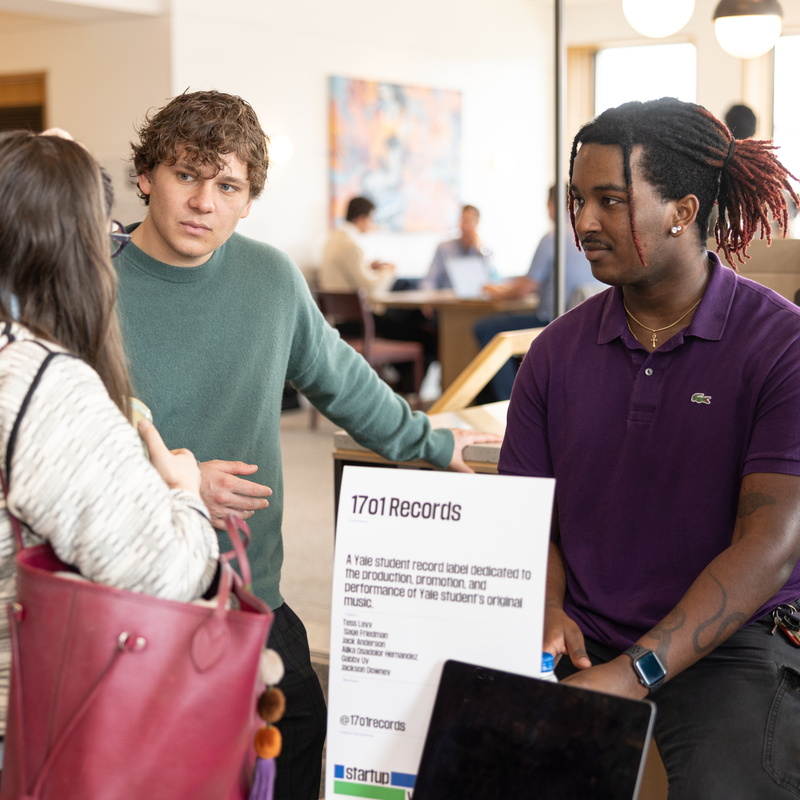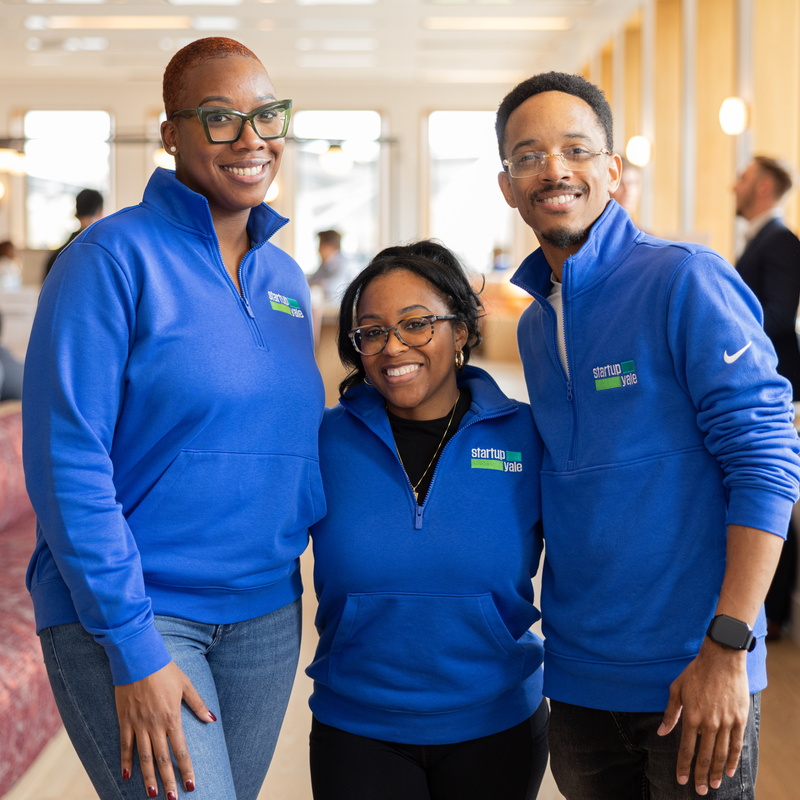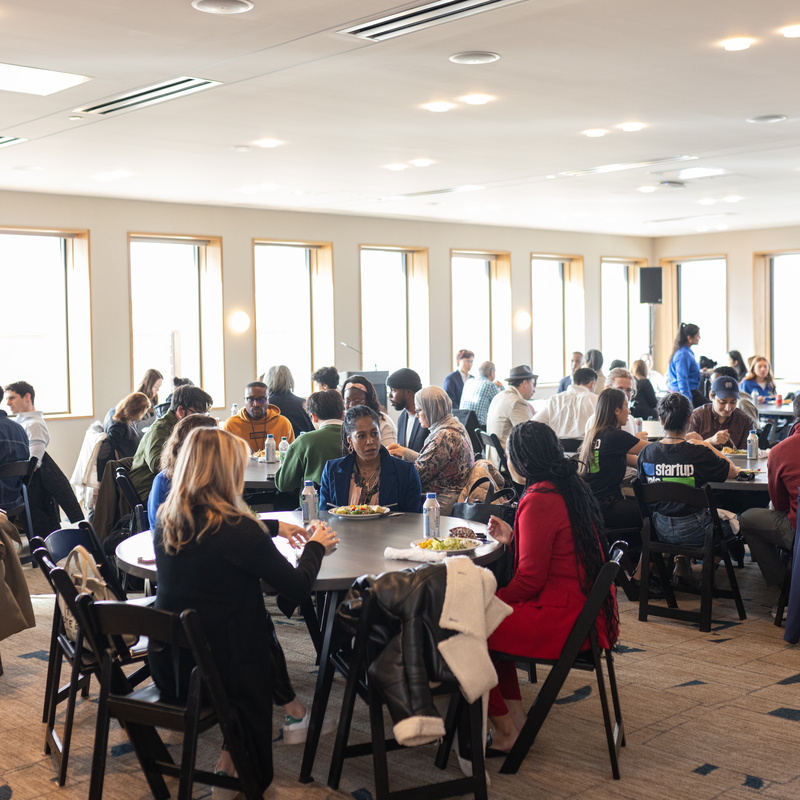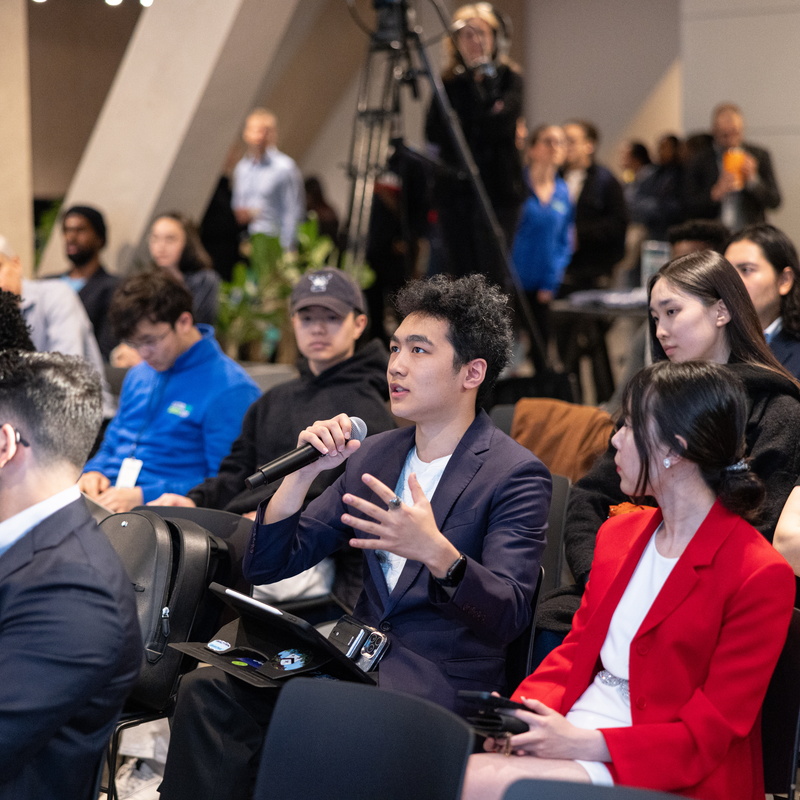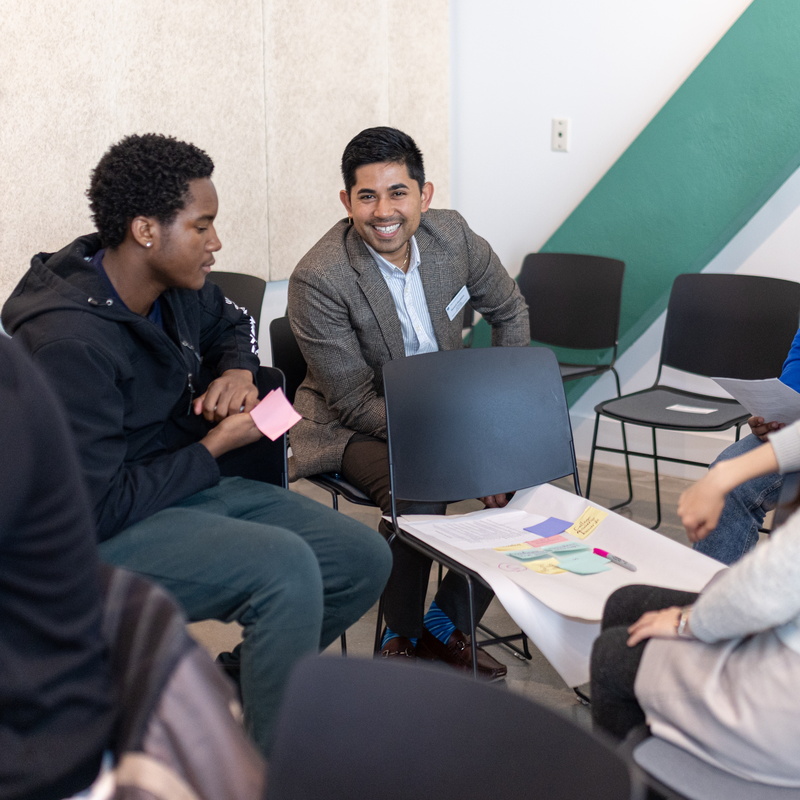Growing and Rebranding: What Entrepreneurs Can Learn from Startup Yale’s Evolution
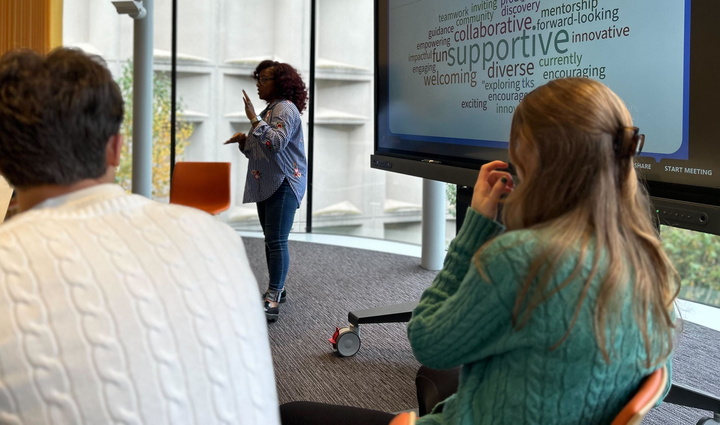
As student innovators and entrepreneurs work with Tsai CITY to bring their ideas to life, they often adapt and refine their original vision. It’s no surprise that an organization that empowers students to innovate and iterate, would consider doing the same. In fact, it’s natural for organizations and projects to evolve over time, and Startup Yale 2024 is a great example of what that looks like in action.
Startup Yale, now in its ninth year, is Yale’s biggest entrepreneurship awards event. Tsai CITY organizes Startup Yale in collaboration with other entrepreneurial centers and organizations from across the university. Over the years, the planning team has experimented with different venues, schedules, and agendas. This year, they took a more active, community-focused approach—and redesigned the event’s visual identity to help promote the changes.
Many entrepreneurs will see their ideas change and grow, often in response to audience feedback. When that happens, it's common to wonder, "Is it time to rebrand?"
The Startup Yale team shares a closer look at what the rebranding process looked like for them.
Step 1: Recognize when changes are necessary.
In 2020, the pandemic forced Startup Yale to move online—and to do it fast. Abby Winslow, Director of Operations and Technology at Tsai CITY and Co-lead of Startup Yale remembers, “We had to pivot in about four weeks, maybe less, to an entirely virtual Startup Yale. Out of survival mode, we said, ‘Scrap everything but the pitch competition.’” They stuck with that streamlined virtual format in 2021 and 2022.
When Startup Yale returned in person in 2023, the organizers felt like they were back in pilot mode, so they kept the focus on the pitch competitions. Afterward, they gathered to discuss how it went.
Rochelle Goodwin, Director of Communications and Marketing at Tsai CITY, says, “In the debrief, there was talk about how the turnout wasn’t as great as we wanted it to be, and we were comfortable asking, ‘Why was that’?”
The answer they landed on was that, other than listening to pitches, attendees didn’t have much to do. Many people came to watch a friend pitch and left after that particular competition was over.
Moving forward, the Startup Yale team knew they wanted to both grow their audience and make the event more participatory. A year out from Startup Yale 2024, they started thinking about what that would entail.
Matt Gira, Tsai CITY's Director of Student Programming and Co-Lead of Startup Yale, recalls, "We felt the need to shake things up to maximize our resource utilization." They reached out to partner organizations, expressing the desire for a different approach that would be beneficial for all. He adds, "The proposal wasn't difficult to sell."
Step 2: Listen to your audience to understand their needs.
The Startup Yale team wanted to attract more creatives and innovators to the event and give them ways to learn and network. Pre-pandemic, Startup Yale had included keynote speeches and workshops, and the organizers considered bringing those back. Before making any plans, though, they checked in with their target audience: the students.
“We really pride ourselves on listening to students and tailoring our programming to what they need, as opposed to what we think they need.”
Rochelle Goodwin, Director of Communications and Marketing at Tsai CITY
Goodwin says, “We really pride ourselves on listening to students and tailoring our programming to what they need, as opposed to what we think they need.” She explained that feedback from past attendees indicated a desire to connect with mentors, potential investors, and peers in entrepreneurship and innovation. They expressed interest in discussions, knowledge exchange, and collaborations that could aid their entrepreneurial journey, as well as entrepreneurship-focused workshops on topics like funding, marketing strategies, professional development, and growth.
Once the team had a vision in place for Startup Yale 2024, they realized the event’s existing logo and branding no longer felt like the right fit. “A strong visual identity isn’t just about aesthetics; it helps support the event theme, makes your brand more recognizable, shapes the attendee experience, and creates a professional and cohesive feel,” Goodwin explains, “It's not just about making a design look good. It's about using the design to meet your goals, strengthen your brand, make it easier to navigate and engage, and create the feelings you want.”
They reached out to Wkshps, a design firm, for help.
Step 3: Create a new brand identity.
To convey Startup Yale’s changes to potential attendees, the organizers sought a visual identity that reflected the event’s more dynamic approach. Goodwin says, “I wanted to tell everyone, ‘It's not going to be like last year. There's a lot more here.’”
The redesign process typically begins with a discovery phase that includes discussions, interviews, and questionnaires. Goodwin describes the early conversations with Wkshps as “enlightening and educating.” She identified gaps in Startup Yale’s existing branding and clarified their goals to the design team.
To create the event’s new look, Wkshps familiarized themselves with Startup Yale’s target audience, personality, and long-term aspirations. They also conducted market research to help the event stand out.
Wkshps presented three designs to the Startup Yale team, and one stood out for its refreshing color palette and bold typography. Goodwin recalls, “What really caught our eye was the strong font choice that gave the brand a new modern look, and the fact that the subsequent branding materials focused on accessibility, which enhances the brand’s reputation, expands its attendees and participant base, and fosters a more inclusive environment.”
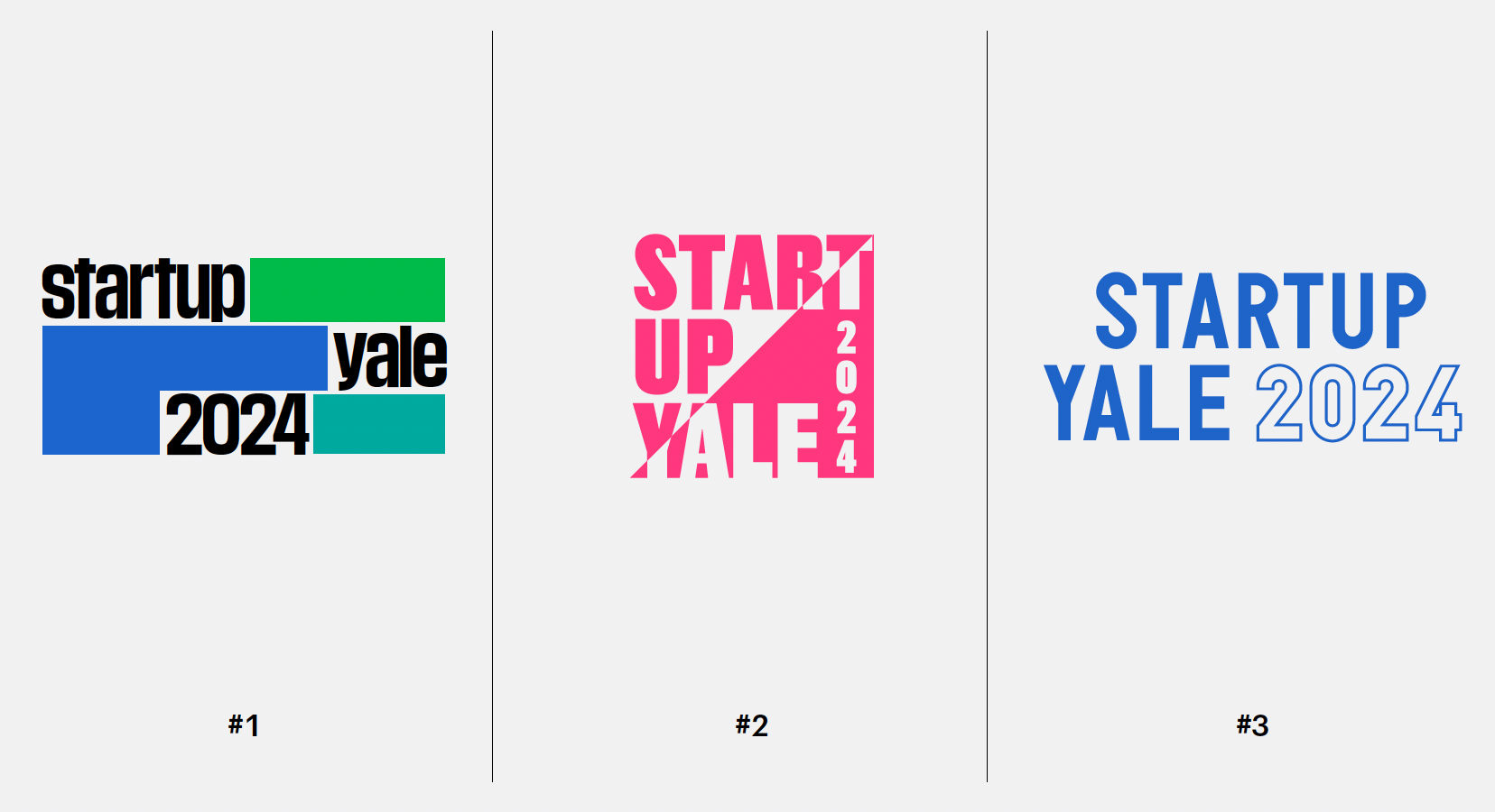
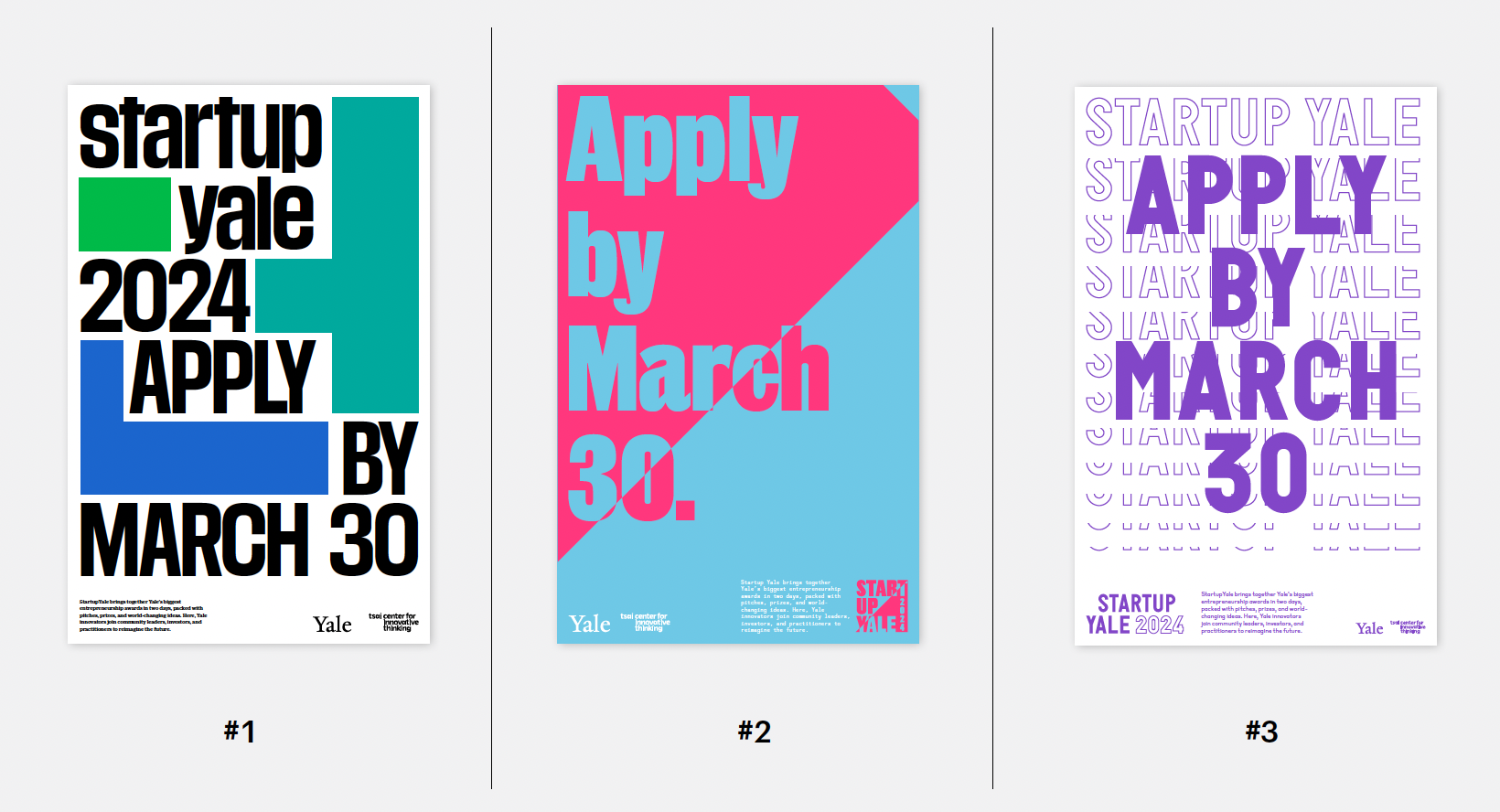
Once the vibrant new visual identity was in place, Wkshps developed related tools, including an updated website, stationery, presentation decks, and conference materials.
Goodwin says, “The most rewarding part about this process was witnessing our abstract ideas gradually take shape and transform into a tangible brand identity that perfectly encapsulates the Startup Yale event.”
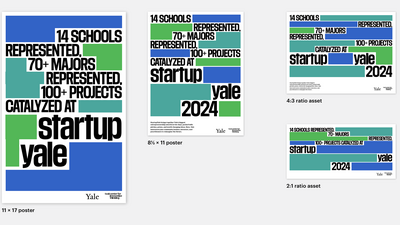
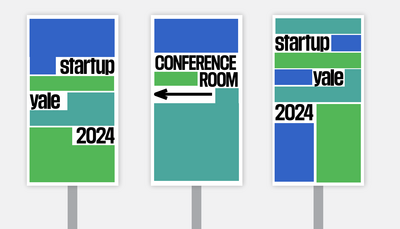
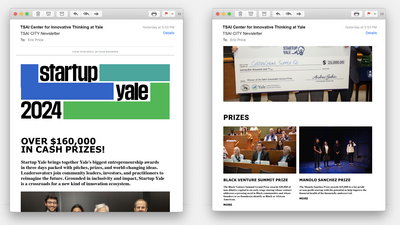
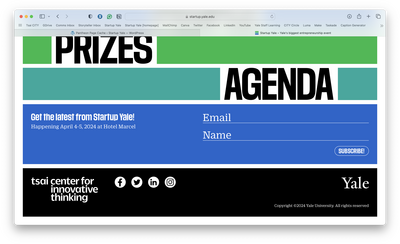
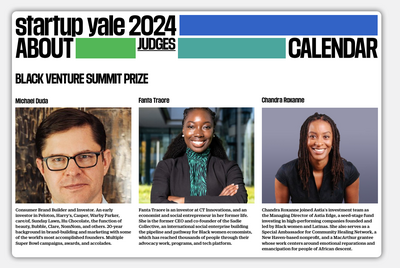
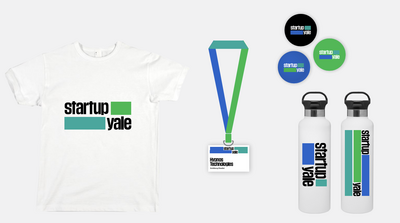
Step 4: Implement and iterate.
Based on feedback from past attendees, the Startup Yale team knew they wanted to create a much more participatory event, and that informed the 2024 agenda. Goodwin says, “We carefully listened to our audience’s needs and incorporated elements that they expressed interest in, like networking opportunities, panels, and skills-based workshops.”
When the team reached out to potential speakers, they emphasized their intentions to make it a more energetic, interactive experience for students. Gira presented it as an opportunity to mingle with innovative students and have deep conversations. He says, “Basically, we wanted to make sure they got the picture—that we're shooting for a more engaging and impactful shindig.”
Those plans come to fruition at Startup Yale 2024, which takes place April 4-5, 2024. Beyond the pitch competitions, where more than $160,000 in prizes are up for grabs, the 2024 event offers speakers, workshops, postering sessions, investor matchmaking and networking sessions, and more.
It’s all happening at the Hotel Marcel, a zero-emission hotel in New Haven developed by a Yale alum. This is the first time that the event has been held off campus. Gira adds, “The new venue is really nice, because we have a huge space, but we also have breakout spaces. So we can host four prizes at once instead of just one at a time.”
Winslow is looking forward to the new location, which she considers yet another experiment. “We might need to pivot in future years, because taking it off campus might not work. But I'm really excited to try.”
The organizers will watch closely to see how students respond to the changes and how long they stick around. Gira says, “If people are there all day, and they loaded up their day and really prioritized it, that to me is a big sign that we did this right.”
